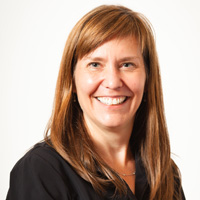Stephanie Platz, Managing Director, Programs, writes about our grantmaking and impact investing in Chicago and shares how community members are building a more just and vibrant city.
In our Chicago-based grantmaking, we strive to listen to and elevate the voices of community members, whether through the support of Press Forward Chicago and its grants to local media outlets or through the execution of community-designed economic development plans.
We also celebrate the extraordinary efforts of leaders in our city’s nonprofit sector and help them lift up the health, well-being, and professional development of their staffs—as they navigate in their day-to-day work preventing gun violence, supporting entrepreneurs, or shifting the narratives that are told about our neighborhoods.
In 2024, MacArthur reinforced our strong commitment to the city we call home. With 150 grants and impact investments totaling $69,031,500, we remain fully dedicated to seeing Chicago be a just, verdant, and peaceful home for all who live here.
 Chicago Commitment
Chicago Commitment
Advancing Leadership
Since its inception, the Chicago Commitment has sought to recognize a diverse array of effective leaders who bring transformative change to their communities. One initiative, Leaders for a New Chicago, is key to highlighting the work of community-centered leaders.
Since launching in 2019, our partnership with the Field Foundation has awarded $3.25 million, with $25,000 each to 65 individual leaders and $25,000 to each of their home organizations. It promotes and advances leaders with “no-strings-attached” funding, facilitating their ability to inform and improve decision making across the city while taking time for health, well-being, and rest.
We renewed our support for Leaders for a New Chicago with a grant of $4.375 million over five years to the Field Foundation.
In 2024, we renewed our support for Leaders for a New Chicago with a grant of $4.375 million over five years to the Field Foundation, ensuring that this powerful resource for our city’s nonprofit staff members will remain available.
The Chicago Commitment recognized the leadership of different giving circles and affinity funds, which rely on volunteer time and personal contributions to make grants across diverse communities. A grant of $3.1 million will support the capacity and regranting programs of six Affinity Funds based at the Chicago Community Foundation: African American Legacy; Asian Giving Circle; Disabilities Fund; LGBTQ Community Fund; Nuestro Futuro; and Young Leaders Fund.
Finally, an award to Latinos Progresando contributed to the publication of a report on the Mexican population in Chicago and Cook County, focusing on wellness, economics and labor, education, leadership, and Mexican identity in the metropolitan area.
Civic Partnerships
As we have since 2016, MacArthur contributed significantly to the Partnership for Safe and Peaceful Communities (PSPC), a collective of over 50 donors working together to support community-led, evidence-based solutions to address gun violence.
In 2024, awards supported the direct service elements of PSPC called Communities Partnering 4 Peace and READI Chicago. These programs serve individuals who are most likely to be involved in gun violence, offering a variety of services that culminate in new opportunities with living-wage jobs.
Culture, Equity, and the Arts
In the years 2013 through 2015, arts funders only directed 22 percent of grants to arts organizations in Chicago to Black, Indigenous, or people of color-led organizations. A report from Enrich Chicago found that from 2020-2023 that level increased to 40 percent of grants, with 71 percent of grants providing unrestricted support. This is a positive trend, but arts funders can do better.
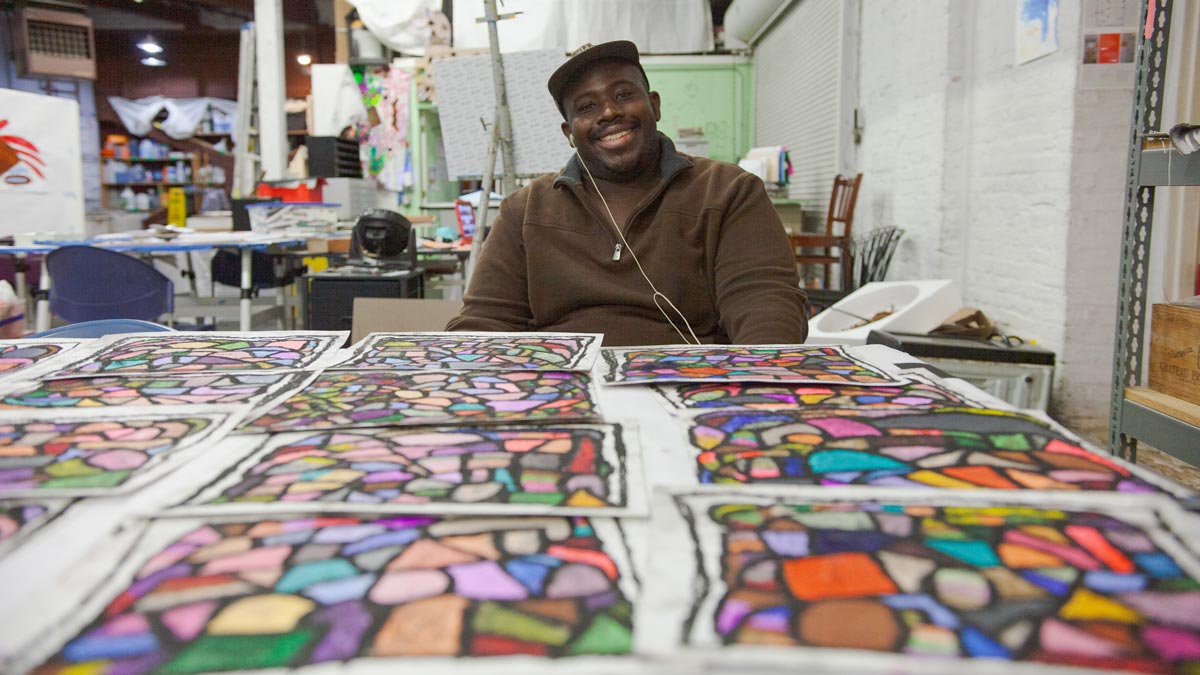
Artist Marcus Kennedy seated by a table covered with his artwork in the Arts of Life Chicago Studio. Arts of Life offers vocational opportunities in the arts to adults with intellectual and developmental disabilities. Credit: Jeff Rosal
Each year since 2019, the Chicago Commitment’s Culture, Equity, and the Arts program offers multi-year general operating support grants to arts, cultural, and arts-centered organizations that prioritize equity. In 2024, this program made 25 grants totaling $5.5 million to organizations selected for consideration by a panel of external advisors who made recommendations through a participatory process. These grant recipients are located across the city, from the far North Side to Chicago’s South and West Sides; they work closely with people with disabilities and/or offer programming in traditionally disinvested communities.
In response to the request of current grant recipients of the Culture, Equity, and the Arts program, we considered how to respond to an urgent, collectively defined issue: specifically, the barriers and challenges faced by individual artists and creative workers. The COVID-19 pandemic prompted a reevaluation of working conditions for these professionals and created an urgent need for data-driven advocacy to rebuild and reshape the arts sector in a more equitable way.
Artists’ Cooperative Residency and Exhibitions (ACRE) for the Chicago Arts Census, a comprehensive data collection effort created by and with the creative workers of Chicago. The Chicago Arts Census will amplify the voices of creative workers, serve as an advocacy tool for better working and living conditions, and create opportunities for coalition-building across art sectors.
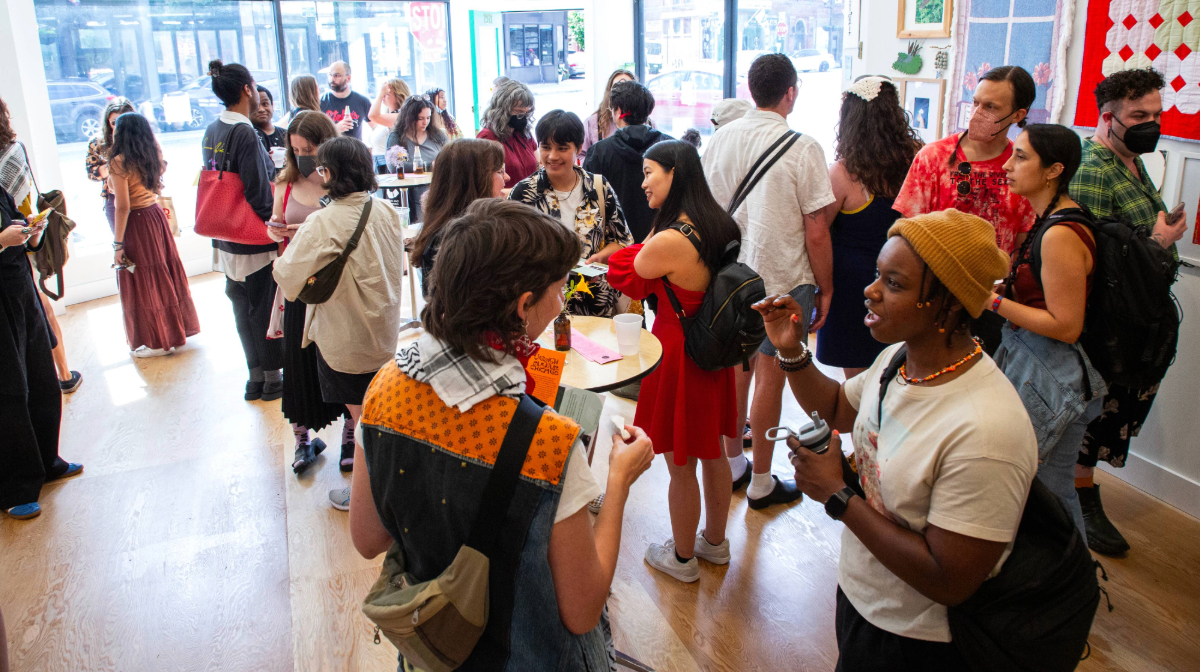
In 2024, ACRE artists partnered with the Jewish Museum of Chicago to host a mutual aid fundraiser for families in Gaza. ACRE collaborates with organizations across Chicago to create opportunities for emerging artists. Credit: Brittany Sowacke
This award was paired with one to DataArts, now based at Southern Methodist University, to identify the current landscape of artists and the creative workforce living and working in Chicago. It will analyze trends in working conditions, compare results to other cities, and identify areas of opportunity to advance support for workers.
Vital Communities
In 2024, the Chicago Commitment team made significant infusions of funds into the city, with new grants of $1.1 million each to organizations pursuing community economic development in ten neighborhoods. Through our Vital Communities strategy, which we refined in 2023, we support organizations that advance plans developed by residents, recognizing that community members know best what their community needs to thrive.
We support organizations that advance plans developed by residents, recognizing that community members know best what their community needs to thrive.
After developing a new initiative with input from local nonprofit leaders and artists, the Chicago Commitment announced a partnership with Elevated Chicago, a project of the Chicago Community Foundation, to offer grants and technical assistance for creative placemaking and placekeeping projects across the city. These regrants will fund community initiatives that utilize arts and cultural installations to stimulate economic activity along commercial corridors.
We made an additional placemaking and placekeeping award to the Muddy Waters MOJO Museum to help preserve the historic home of the legendary blues musician Muddy Waters. A grant to the Rogers Park Business Alliance will support the One Howard Street Economic Recovery Plan, which seeks to return Howard Street to its historical roots as a vibrant, walkable commercial corridor bordering Chicago and Evanston.
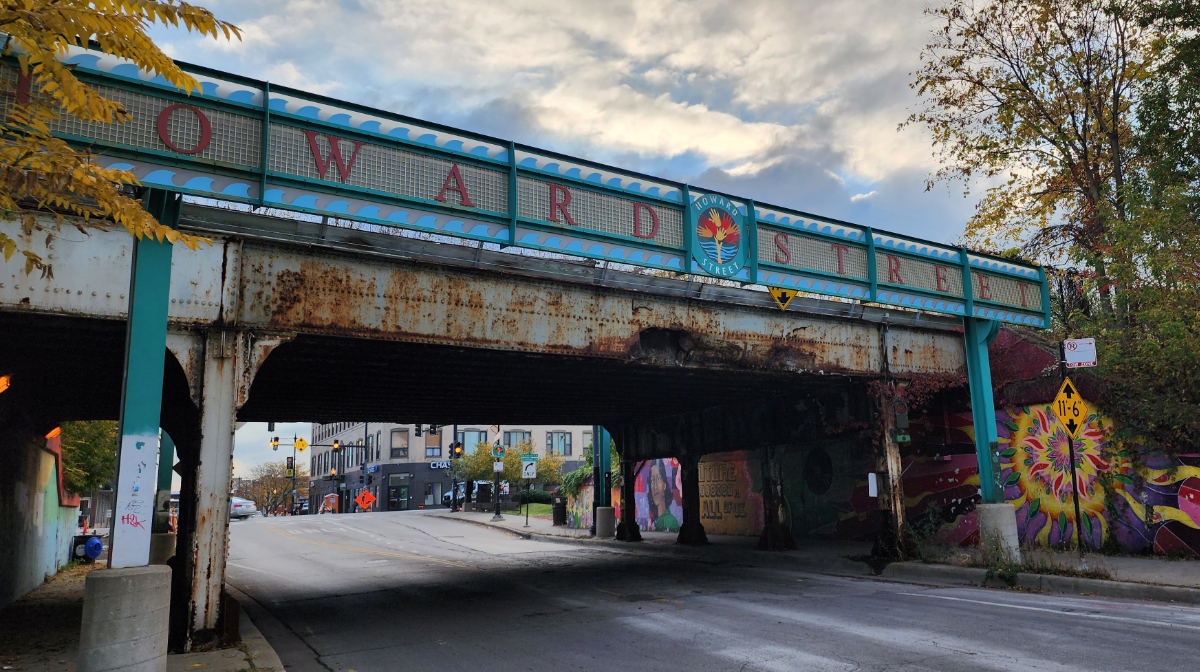
The Howard Street bridge, located at the municipal border of Chicago and Evanston. Vital Communities grantee Rogers Park Business Alliance is collaborating with the City of Evanston to redevelop the historic commercial corridor. Credit: Rogers Park Business Alliance
 Climate Solutions
Climate Solutions
In Chicago, our Climate Solutions team participates in the Climate and Clean Energy Equity Fund, which supports organizations that connect local concerns about communities’ health, environmental, and economic well-being to climate change.
We also support the regional expansion of the Illinois Environmental Council Education Fund to provide education, policy expertise, and technical assistance with the goal of furthering the City of Chicago's commitments and actions toward more equitable and clean energy use.
 Criminal Justice
Criminal Justice
Within Illinois, MacArthur’s Safety and Justice Challenge (SJC) works with both Cook and Lake Counties to achieve our local justice reform goals. In Cook County, with our support, the Center for Justice Innovation collaborates with Chicago Regional Organizing for Antiracism (CROAR) to offer an equity fellowship program.
In addition, the Criminal Justice team supported Lake County’s participation in SJC. This award aids Lake County in achieving further reduction in local incarceration and in targeting racial and ethnic disparities.
This award aids Lake County in achieving further reduction in local incarceration and in targeting racial and ethnic disparities.
A grant to the Center for Criminal Justice Research, Policy, and Practice at Loyola University Chicago facilitates implementing, maintaining, and expanding the Cook County Criminal Justice Data Dashboard. Practitioners, policymakers, and the public can access the dashboard for the most current, complete information about the Cook County criminal justice system.
A cluster of grants addressed the needs of individuals reentering their communities after time in custody:
- The Illinois Justice Project’s Reentry Council received an award to coordinate efforts throughout the State of Illinois to build a more supportive, equitable, and effective process for reentry.
- The Illinois Prison Project advocates for the creation and expansion of mechanisms to correct unjust, unnecessary, or excessive sentences. This award provides continued support for Equip, Empower, and Engage, a project to elevate the voices, experiences, and expertise of formerly incarcerated people as they educate communities about the need for sentencing reforms.
- The Women’s Justice Institute (WJI), a project of A Safe Haven, draws on the leadership of formerly incarcerated individuals to improve outcomes and ensure greater safety for justice-involved women.
Finally, we supported Access Living to facilitate its management of an advisory committee consisting of justice-involved people with disabilities to provide strategic advice and guidance on diversion, reentry, and public education work.
 Impact Investments
Impact Investments
The Impact Investments team, which makes program-related investments and grants, demonstrated a strong commitment to equity in 2024 through support of Chicago’s entrepreneurs, developers, and social enterprises.
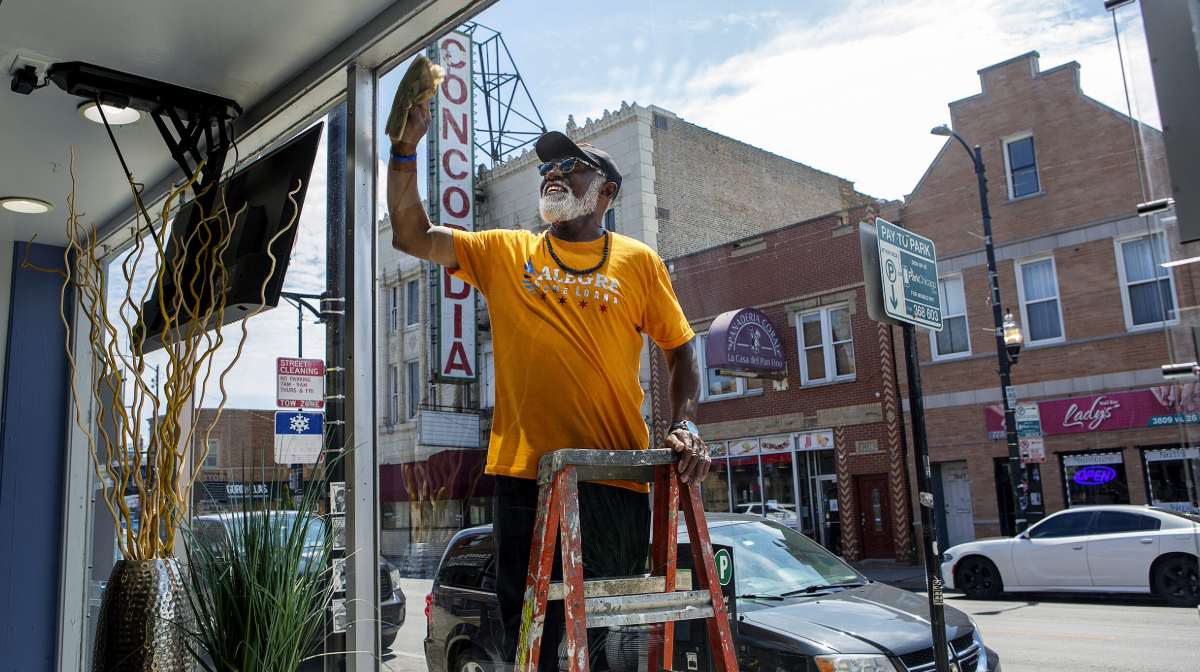
An employee at a local business in Little Village cleans a storefront. The business is supported by the Fund for Equitable Business Growth, which provides business development services to entrepreneurs of color in Chicago. Credit: Fund for Equitable Business Growth
We renewed an award to the Fund for Equitable Business Growth, a project of the Chicago Community Foundation, which boosts the capacity of business support organizations to provide mentorship, specialized business services, and access to networks for entrepreneurs working in Chicago’s communities.
An award to Capital Impact Partners enabled it to bring its Equitable Development Initiative to Chicago. This cohort-based program for emerging developers working in underinvested communities provides formalized training, technical assistance, and mentorship. Since its inception, the Equitable Development Initiative program has managed 15 cohorts, reaching a total of 315 developers across the country.
The Equitable Development Initiative program has managed 15 cohorts, reaching a total of 315 developers across the country.
Benefit Chicago, which we support, made a program-related investment to LiftUp Enterprises, a for-profit, Minority Business Enterprise (MBE) that creates employment. Its mission is to accelerate the stability and mobility of its employees and to bridge the wealth gap. LiftUp Enterprises will create jobs in high turnover sectors, such as commercial cleaning and landscaping, with living wages that offer quality benefits, leading to increased employee and customer retention.
Finally, with a MacArthur grant, Impact Engine produced a landscape report on the impact investing sector in the Midwest, which was released at the Midwest Impact Investing Showcase in Chicago in October 2024.
 Journalism and Media
Journalism and Media
Another Enduring Commitment, the Journalism and Media Program (JAM) renewed an award to the Black Youth Project (BYP), based at the University of Chicago, which examines the social and political attitudes and behavior of Millennials and Gen Zers of color. This award supports GenForward, a nationally representative survey that studies how race and ethnicity shape how young adults think about the world. It also supports BYP’s digital magazine, Black Life Everywhere.
In addition, JAM funded Public Narrative, which features community voices in media, shifting narratives around public health, public safety, and public education, and is now serving as the new home of the Chicago Independent Media Alliance.
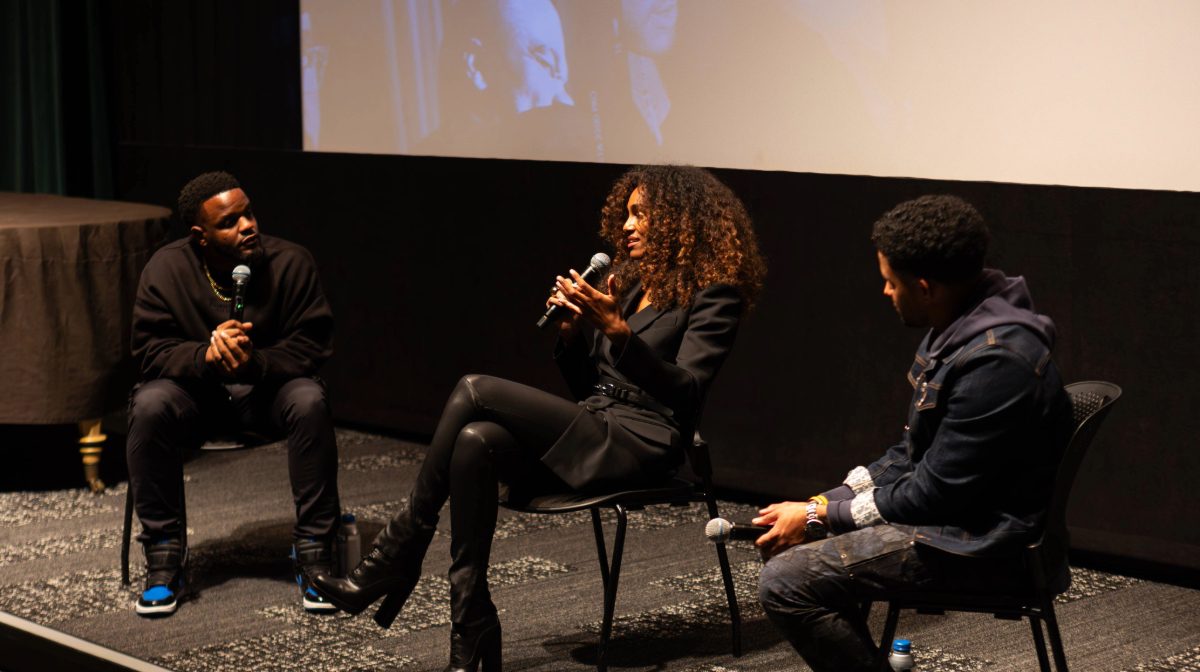
A panel at the 30th annual Black Harvest Film Festival featuring Gelila Bekele (center) and Armani Ortiz (right), the directors of Maxine's Baby: The Tyler Perry Story. The festival showcases work created by and celebrating Black, African American, and African filmmakers. Credit: School of the Art Institute of Chicago
A grant to Project& supports its use of media and culture to spark and expand civic engagement in communities that have historically been excluded from full participation in the democratic process. Project& engages artists, activists, and grassroots communities in efforts to reimagine what democracy means to them.
Finally, JAM made grants to Sisters in Cinema for panel discussions that were part of the Sundance Institute x Chicago 2024, and to the School of the Art Institute of Chicago’s Gene Siskel Film Center for the Black Harvest Film Festival.
 Local News
Local News
Our Local News Program addresses the decline in local journalism and counters the lack of accurate and reliable news across the United States. One of MacArthur’s earliest actions as part of the program was our leadership and support for the launch of Press Forward, an unprecedented donor collaborative of national, regional, local, and issue-based funders. This collaboration has committed over $500 million to support local journalism and, in doing so, has sparked wider and sustained funding for local news.
As part of this effort, we committed funds to The Chicago Community Trust, home to Press Forward Chicago, 1 of 36 chapters that make up a broader national movement. Press Forward Chicago received an award of $3.3 million in 2024 to augment a prior award in 2022.
Press Forward Chicago recently announced $1.3 million in awards. These grant recipients utilize civic journalism and storytelling platforms that amplify community voices, expose critical issues, and inform resident-driven actions. The inaugural grants from Press Forward Chicago prioritized building the capacity of newsrooms operating with annual budgets under $2 million.
Recipients utilize civic journalism and storytelling platforms that amplify community voices, expose critical issues, and inform resident-driven actions.
In addition, we were thrilled that Press Forward Chicago named Tracy Baim its Executive Director in the fall of 2024. Baim brings decades of experience to this role, having worked as a journalist, publisher, and coalition builder. She will leverage her experience to champion community media and advocate for essential resources.
In 2024, Local News supported several independent media outlets in the Chicago area. These included grants to the Chicago Reader and to Cicero Independiente, a bilingual newsroom serving the majority Latine suburbs of Cicero and Berwyn, Illinois.
 2025 and Beyond
2025 and Beyond
The key themes of the MacArthur Foundation’s contributions in 2024–celebrating leaders from every corner of the city, supporting Chicagoans as they build thriving communities, and bolstering the vibrancy of an independent media sector–will continue into 2025 and beyond. Together these efforts will advance equity in the city for all.



